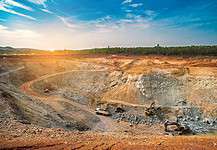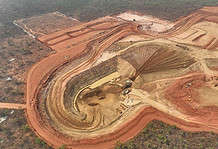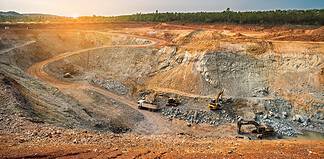MP Mick Murray at Premier Coal mining operations in Collie. Image: West Australian Government.
BY JESSICA CUMMINS
SURROUNDED by an abundance of national parks, forests and man-made waterways, WA’s only coal mining town, Collie, has a long history, and continues to generate a large proportion of WA’s energy needs.
Like many mining towns, Collie has had its fair share of booms and busts dating back to the first development of its coal fields in the late 1800s.
Shire of Collie chief executive David Blurton said before the commodity was discovered in Collie, the State was relying heavily on imported coal, and the Government offered incentives for the discovery of a local energy source.
“The period between 1930 and 1960 in particular was a time of great prosperity and growth for Collie [until] a significant coal mining operation in Amalgamated Collieries closed its doors unexpectedly,” Mr Blurton said.
“This led to a 41 per cent decrease in the coal mining labour force, which saw many families leave town [causing] much economic, psychological and emotional stress.”
While many workers were redeployed on government projects, including the construction of Muja Power Station in 1962 to lessen the impact on the local economy, Collie experienced a period of stagnation.
“Over the next 10 years many houses and shops remained empty,” Mr Blurton said.
“In 1983 the signing of a 20-year contract by Premier Coal to supply 26 million tonnes of coal to Western Power until 2003 provided security to their workforce of 800 and the community.”
The 1990s were marked by extreme pressure on companies to reduce expenses, which led to the decision by Premier Coal to “completely close underground coal mining in 1994.
“The shift from underground mining to open cut required the use of larger machines and was less labour intensive, which resulted in job losses of 239 employees at the Premier operation,” he said.
While periods of uncertainty had led to businesses closing down and a decrease in demand, Mr Blurton said boom periods on the back of construction projects had attracted more residents to the region.
Today, mining companies such as Premier Coal and Griffin Coal, played a significant role in the town.
“In addition to coal mining and power generation activities, Collie also hosts the Worsley Alumina refinery, which is the largest single employer in the shire,” Mr Blurton said.
“The refinery underwent a $US2.2 billion expansion project in 2008 and this project, coupled with the construction of the Bluewater’s PowerStation in 2009 was a significant boom era on the back of these construction projects.
“This saw house prices increase significantly [as well as its] population – however the population has since returned to pre-boom levels.”
Premier Coal mine about 15km east of the town in the Jarrah forests of WA. Image: Collie River Valley Marketing Group.
Regional Challenges
Fast forward to present day and Collie still had its ups and downs.
“Unlike the eastern seaboard where coal is exported, Collie coal is consumed by the local market in WA and [is] the only coal mining community in the State,” Mr Blurton said.
In April this year, The West Australian reported on the struggling profitability of both Premier Coal and Griffin Coal under State contracts.
Collie-Preston MLA Mick Murray said Synergy produced “quite a large lump of Western Australia’s power” which was supplied by Premier Coal.
“But that’s where the nervousness starts because there are contracts due and we don’t know what the targets are going to be both federally or by State,” Mr Murray said.
“There is some nervousness – there are about 750 direct jobs in coal mining and about 400 in power generation and under that is contractors that do the work.”
Despite chatter around contracts, Premier Coal was charging ahead with new developments at the Premier mine, including a complete machine rebuild of some of its major mining equipment in house.
“[We are] utilising our own workforce and workshop facilities – so far we have successfully overhauled trucks, dozers and graders, which has proven to be extremely successful,” Premier Coal investor relations and corporate affairs general manager James Rickards said.
“As part of our commitment to ensure reliability of supply of coal to our customers we are [also] scheduled to take delivery of a new Liebherr 996 excavator in March 2019 and a Liebherr 9400 in 2020.”
He said the company had implemented various fleet and shift efficiencies to improve production and crew operations, while continuing to consider new mining areas given ongoing market challenges.
Mr Murray said the government, however, was working on a ‘transitional’ plan for when coal would eventually be replaced by other energy sources.
“The plan is still being worked on as to where, how long and how much this would cost – we are still waiting on some direction forward, which makes it very difficult.”
Mr Blurton said the Shire had long called on the State government to provide direction and a timeline on the changing energy mix in WA.
“This direction is critical to the town’s future given the current reliance on coal mining and coal-fired power as our foundation industries,” Mr Blurton said.
However, Mr Blurton said the shire expected coal to form an important part of the State’s energy mix for the foreseeable future.
“During this time, it is important for us to begin transitioning our economy and support the growth of alternative industries to ensure the long-term sustainability of our town,” he said.
Mr Murray said private contracts such as Blue Waters and Griffin Coal still had some years left on their agreements.
“It’s not like the government can interfere,” Mr Murray said.
“People that think Collie is going to be finished within a couple of years are far off their mark, well and truly off the mark.
“I do see Collie has a future and a good one, it’s just a matter of working on bringing other industries into the town to make sure that continues.”
Mr Murray said if it had not been for coal fired power stations, the State would have been in a worse situation than it was after the Varanus Island gas plant explosion in 2008.
The gas pipeline from the island to the Pilbara exploded in June 2008 and subsequently cut WA’s domestic gas supply by about a third for more than a month.
“The incident cost the State around $2 billion but it would have been double that if we didn’t have coal in place,” he said.
“There are some security measures that have to be answered to by the government at the same time.”
New Horizons
In recognition of Australia’s evolving energy mix, Mr Blurton said the shire was in the middle of forming an economic development plan for the town to minimise the impact of economic changes.
“We are working hard to support the development of new non-traditional industries in Collie such as tourism, intensive agriculture and alternative energy supply industries as well as working with the state to explore alternative uses for coal,” Mr Blurton said.
Mr Blurton said the town was prepared for industrial expansion with the development of the Shotts and Coolangatta Industrial parks and its expanding light industrial area.
“These strategic land parcels position us well to capitalise on any future mining expansion and positions to attract alternative heavy industrial development,” he said.
LandCorp had been developing the Shotts Industrial Park, 7.5km east of Collie, strategically between three major power stations and associated coal mines.
The development was set to attract large-scale industries, which would add value to Collie’s existing energy and coal production.
“We have accessed an abundance of water which is set aside for industrial use, [we have] access to a rail network, and we are in proximity to the Port of Bunbury, so Collie is well positioned to capitalise on the next wave of industrial development.”
In August 2018, Perth-based computing company DC Two also announced plans to build a behind-the-grid-data centre in partnership with energy supplier Hadouken.
DC Two subsidiary D Coin co-founder and general manager Michael Whitehorn said unless new processes could be found to reduce CO2 emissions from coal, Collie as a town “might disappear” with the abandonment of local power generation.
“Our proposition is to develop job opportunities around ‘new to’ Collie industries, building on a backbone of expanding local renewable capacities,” Mr Whitehorn said.
The data centre was planned to sit alongside a $16 million, 20MW solar farm in Collie, which obtained planning permission in April.
“It would be the first of its kind in Australia and involves the development of a data-processing facility with a focus on crypto currency mining and data storage, which is energy intensive,” Mr Blurton said.
“The project has made headlines internationally and [will provide] the town with a new industry.
“It’s a good example of an alternative industry, which will help diversify our economy.”









































